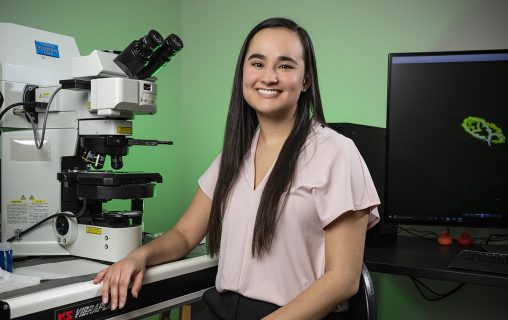
Kaitlyn Miller, a physiology and neuroscience student at Wright State, researched technologies that help Navy and Marine Corps divers overcome underwater challenges for her winning essay in the Naval Horizons Essay Contest.
Kaitlyn Miller, a physiology and neuroscience major at Wright State University, was one of the winners in the Naval Horizons Essay Contest.
Naval Horizons introduces students to cutting-edge science, technology, engineering and mathematics topics that impact the U.S. Navy and Marine Corps.
Essay contestants are provided with several videos with different topics relating to environmental science, aerospace optometry, autonomy, oceanography and more. They are asked to choose a video, explain the importance of the subject to the Navy and Marine Corps and describe how the scientist’s work inspired them and how the technology would change daily life in the year 2040.
Miller chose the video “Undersea Medicine,” based on the research of Sandra Chapman, Ph.D., who helps Navy and Marine Corps divers overcome underwater challenges. Some of these challenges include underwater apnea, bulky and heavy equipment, limited visual and spatial awareness in the dark and murky waters and changes in underwater temperature.
“I was inspired by this topic because of Dr. Chapman’s innovative ideas which are also logical and practical in research,” Miller said. “Her very creative work is an inspiration to me as a student and has influenced me to think outside the box for new ideas and solutions. She is dedicated, excited and driven by her work, the people around her and the challenges she faces in the world. Listening to her has encouraged me to be diligent in my lab work because the things I do there could help many people in the future.”
One of Chapman’s innovative ideas is the use of catalysts in diving masks. The catalysts replace bulky oxygen cylinders by splitting water in order to retrieve the oxygen. Her idea for a visual display in divers’ helmets that use sonar scanning to help enhance their spatial awareness can potentially keep them safe from predators in the water.
Miller has also been working as an undergraduate research assistant in the microscopy lab at the Naval Medical Research Unit – Dayton. She presented at a Tri-Service Toxicology Consortium Meeting, the Society of Toxicology in San Diego and at OMV-SfN Neuroscience Day.
In her spare time, Miller volunteers with various Wright State organizations, including serving as the president of Compassion in Action, which provides aid to charities throughout the Dayton area, and volunteering in the Human Anatomy and Physiology Interactive Lab and the Neuroscience Interactive Lab.
Off-campus she has volunteered with Global Brigades, working remotely at a clinic in partnership with Las Piletas community in Honduras, and at the Elder Life Program at Miami Valley Hospital.
Miller expects to graduate with her undergraduate degree in the spring of 2023 and her master’s degree in physiology and neuroscience in the spring of 2024 through the 4+1 degree program offered by the Department of Neuroscience, Cell Biology and Physiology. She plans to apply to medical schools in May.

 Wright State psychology team studies ways to identify fatigue in pilots, drivers
Wright State psychology team studies ways to identify fatigue in pilots, drivers  Wright State videographer Kris Sproles wins Regional Emmy and Ohio journalism award
Wright State videographer Kris Sproles wins Regional Emmy and Ohio journalism award  Wright State Boonshoft School of Medicine ranked among the nation’s best for 2024 by U.S. News
Wright State Boonshoft School of Medicine ranked among the nation’s best for 2024 by U.S. News  Exposing biotechnology
Exposing biotechnology  Wright State faculty member Dan Noel uses unique background to inspire new leaders
Wright State faculty member Dan Noel uses unique background to inspire new leaders 